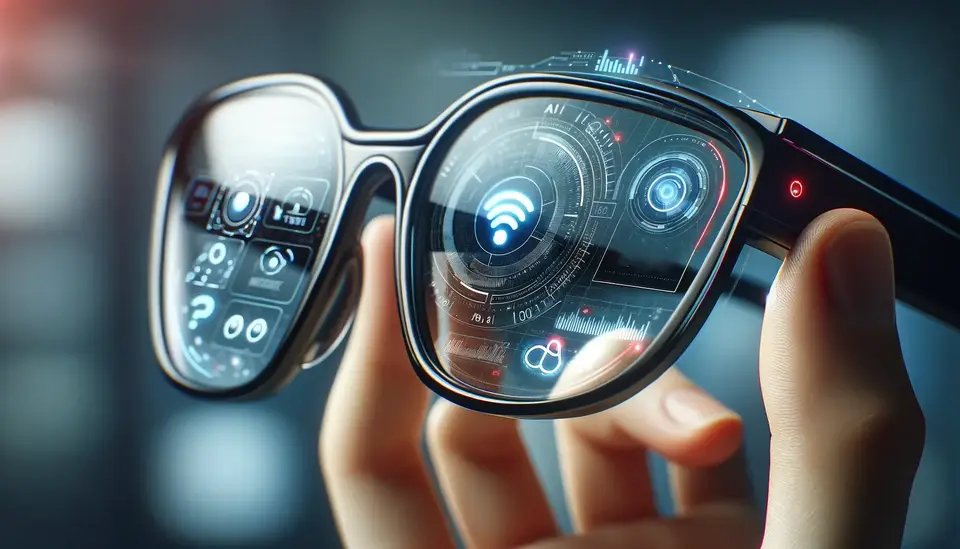justineanweiler.com – Wearable technology is about to experience a significant transformation, thanks to advancements in artificial intelligence (AI). At the forefront of this change are AI-powered smart glasses, which have the potential to change how we interact with technology, our surroundings, and even ourselves. While earlier smart glasses focused on basic tasks like augmented reality (AR) and hands-free computing, the next generation will be smarter, more intuitive, and more immersive, thanks to AI. This article explores how these AI-enhanced smart glasses could revolutionize the wearables industry and everyday life.
The Evolution of Smart Glasses
Smart glasses have been around for several years, but they haven’t yet become mainstream. Early versions, such as Google Glass, offered simple AR features, notifications, and a camera, but they faced problems like short battery life, privacy concerns, and bulkiness. Over time, tech giants like Apple, Microsoft, and Meta have invested heavily in AR and AI research. This has led to breakthroughs that are now enabling the development of more advanced, user-friendly smart glasses.
The next-gen smart glasses will go beyond simple notifications. Thanks to AI, they will be able to understand the world around the user, provide personalized experiences, and enhance productivity and entertainment.
How AI Powers the Future of Smart Glasses
AI is the key factor that will elevate smart glasses to the next level. Here’s how:
- Contextual Awareness: AI-powered smart glasses will have advanced sensors and algorithms that can recognize objects, locations, and even people. Imagine walking into a meeting, and your glasses instantly provide information about the attendees, the meeting agenda, or reminders of past conversations.
- Natural Language Processing (NLP): With the help of AI, smart glasses will allow users to interact naturally through voice commands. These wearables could act as personal assistants, responding to questions, providing updates, and performing tasks hands-free.
- Augmented Reality with AI: AI will make AR experiences more interactive and tailored to individual needs. For example, your glasses could translate foreign languages in real time, help you navigate unfamiliar areas, or highlight important details in your surroundings.
- Health and Wellness Monitoring: AI-enhanced smart glasses could revolutionize health tracking. Equipped with sensors that monitor vital signs like heart rate, eye movement, and body temperature, the glasses can use AI to detect fatigue, stress, or potential health issues, providing personalized wellness insights.
- Integration with IoT Devices: AI will allow smart glasses to connect seamlessly with other smart devices, enabling users to control their homes, adjust their car settings, or interact with other gadgets just by using their glasses.
Applications Across Industries
The versatility of AI-powered smart glasses opens up endless possibilities in different industries:
- Healthcare: Doctors and surgeons could use AI-enhanced glasses to access patient records, receive real-time diagnostic support, or even guide them through complex surgeries with AR overlays. This could improve accuracy and efficiency in medical practices.
- Education: In education, students and teachers could benefit from immersive, interactive lessons. AI-powered smart glasses could provide personalized learning suggestions, real-time feedback, and enhance remote learning.
- Workplace Productivity: In industrial settings, AI-enhanced glasses can improve safety and efficiency by delivering real-time data, instructions, or troubleshooting guidance. In office environments, employees could benefit from smart assistants that help with scheduling, task prioritization, and productivity insights.
- Entertainment and Gaming: AI-powered smart glasses could revolutionize entertainment and gaming by providing immersive AR experiences. Imagine playing video games where the real world blends seamlessly with the virtual, or watching concerts and sports events enhanced by interactive elements.
Challenges to Overcome
While AI-enhanced smart glasses have tremendous potential, several challenges need to be addressed for widespread adoption:
- Battery Life: As AI processes require more power, maintaining a long battery life without sacrificing performance will be crucial.
- Privacy and Security: With AI constantly collecting and analyzing data, there are privacy concerns. Manufacturers must ensure robust data security and be transparent about how user data is stored and used.
- User Comfort and Design: The glasses must be comfortable and stylish enough for daily wear. Striking a balance between design and functionality will be key.
- Cost: Next-gen smart glasses will likely come with a high price tag initially. As the technology matures, it will need to become more affordable to reach a larger audience.
Conclusion
AI-enhanced next-gen smart glasses have the potential to revolutionize the world of wearables. From boosting productivity and enhancing communication to offering new ways to experience entertainment and improve health, these glasses will transform how we interact with technology. As AI technology continues to advance, the capabilities of smart glasses will expand, opening up new opportunities for personalization, convenience, and efficiency.
The future of wearables is exciting, and AI-powered smart glasses could be the next major leap in this evolving field.




